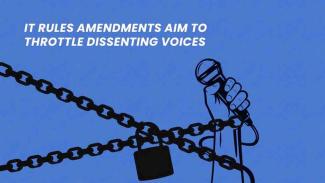The recent amendments to the Information Technology Rules brought in by the Modi government provide for draconian and arbitrary powers in the name of ‘fact-check’. On April 6th, 2023, the Ministry of Electronics and Information Technology (MeITY) notified the Information Technology (Intermediary Guidelines and Digital Media Ethics Code) Amendment Rules, 2023, conferring power on MeITY to notify a ‘fact-check unit’ of the Union Government that will identify fake, false, or misleading online content in respect of any business of the Union Government.
“These amendments to IT rules aims to wipe out all dissenting voices from the internet under the garb of ‘fact check’,” said Dipankar Bhattacharya, General Secretary of CPIML. “This will have a chilling effect on the fundamental right to free speech and expression by creating a police and surveillance body throttling independent press and voices, which is essential for the survival of a democracy,” he added.
The amended rule further states that any news flagged as ‘fake or false’ by the Press Information Bureau (PIB) or any other agency authorized by the Union Government, has to be taken down by ‘intermediaries’ (such as Facebook, Twitter etc.).
PIB’s Fact-Checking Unit: An Extension of Government Propaganda
These carte blanche powers make PIB’s fact-checking unit a surveillance tool of the government to police dissenting voices. Even before the amendments, PIB’s fact checking itself had been facing criticism and observers argued that it worked as an extension of the Modi government’s propaganda machinery. For instance, in 2020, when tens of thousands of migrant workers faced the brutal impact of the Modi government’s unplanned COVID lockdown and everyday headlines of deaths of migrant workers were being reported, the independent fact-checking website – Alt-News in a report on June 6th, 2022 – noted that PIB’s 3 out of 4 ‘fact-checks’ on deaths in Shramik trains (lockdown special trains) were unsubstantiated.
One such case was a video of a toddler trying to wake up his dead mother on Bihar’s Muzzafarpur railway platform. Media reports noted that the mother, a 23-year-old Arvina Khatoon died of heat, thirst and hunger as passengers were not served food or water inside the train. PIB flagged the news as incorrect and imaginary, and that Arvina had died due to some illness. Alt-News’s investigation found that PIB’s fact check was unsubstantiated and noted that Arvina’s family members who were travelling with her on the train — sister Kohinoor and brother-in-law Mohammed Wazir, said that Arvina did not complain of any illness when they left from Ahmedabad to Katihar. However, she was yearning for water on the train. Kohinoor added that they had visited a doctor for a check-up before they got on the train and the examination found that Arvina was fine.
In essence, the amendments vest the MeITY with the power to effectively adjudicate, unilaterally, what constitutes fake or false news, and the intermediaries are now mandated to take them down without any review.
The All India Lawyers’ Association for Justice in a statement said that these amendments must be seen in the context of India facing a free-speech crisis, with journalists such as Siddique Kappan, Khurram, Irfan Mehraj, Gautam Navlakha, Fahad Shah, and raids on BBC, The Wire, The Quint, NewsClick, and NDTV. In fact, India is ranked 150 out of 180 countries in its Press Freedom Index, abysmally low and marked for poor performance across political, legal, economic, socio-cultural contexts, as also safety of journalists.
The CPIML demands immediate withdrawal of these amendments as it attempts to silence critical voices and free press.











